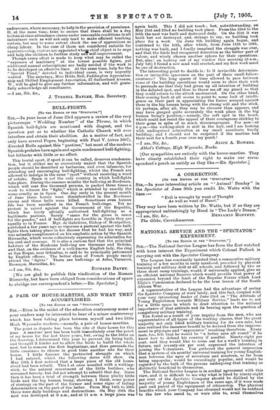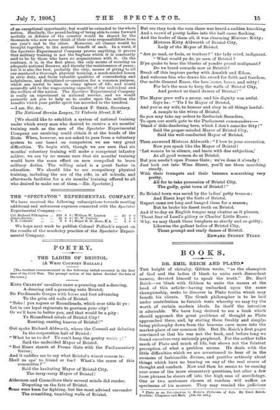NATIONAL SERVICE AND THE " SPECTATOR " EXPERIMENT.
[TO THE EDITOR OF THE "SPECTATOR."]
Sin,—The National Service League has from the first watched with keen interest the Experiment which Colonel Pollock is carrying out with the Spectator Company.
The League has constantly insisted that a consecutive military training of a few months in early manhood, preceded by physical training and military drill at all schools, and followed by two or three short camp trainings, would, if universally applied, give us an efficient national Reserve which would provide that power of expansion beyond the limit of the Regular Forces which Lord Elgin's Commission declared to be the true lesson of the South African War.
A representative of the League had the advantage of seeing the Spectator Company at work lately, and this fact, coupled with your very interesting leader of June 23rd on "The Attitude of Young Englishmen towards Military Service," leads me to ask for a little space in which to draw attention to the national importance of that attitude and its bearing upon the question of compulsory military training.
You found as a result of your inquiry from the men, who are representative of all types of the working classes, that the great majority not only liked military training for its own sake, but also realised the immense benefit to be derived from the improve- ment in physique and "appearance" resulting therefrom. Every man, too, felt that he would be "a better man all round" if he knew how to defend his country if needful. Ninety-eight per cent. said they would like to come out for a week's training in future, and seventy-six per cent, expressed the intention of joining the Volunteers. You gathered the general impression that a system of six months' universal training for young English- men between the ages of seventeen and nineteen, so far from being unpopular, would be exceedingly popular, and would be regarded by the bulk of the persons undergoing that training as distinctly beneficial to themselves.
The National Service League is in cordial agreement with this view, and it is difficult to see why what is liked by ninety-eight per cent. of the Spectator Company should be disliked by the majority of young Englishmen of the same age, if it were made part and parcel of the equipment of citizenship. The physical benefits which your Company has obtained would not be confined to the few who cared to, or were able to, avail themselves of an exceptional opportunity, but would be extended to the whole nation, Similarly, the proud feeling of being able to come forward usefully in defence of the country would be shared by the thousands who now never think of their civic responsibilities from one year's end to the other. Moreover, all classes would be brought together, to the mutual benefit of each. In a word, if the Spectator Experimental Company proves anything, it proves that military training is not the bugbear which it is constantly said to be by those who have no acquaintance with it. On the contrary, it is, in the first place, the only means of securing an adequate national Reserve, and thereby the maintenance of peace ; but it is also the best, probably the only, means of giving to all our manhood a thorough physical training, a much-needed lesson in civic duty, and those valuable qualities of comradeship and helpfulness, and disciplined co-operation for a common purpose, which are useful to men in every sphere of life, and would assuredly add to the wage-earning capacity of the individual and the welfare of the nation. The Spectator Experimental Company is really an experiment in national service, and we would earnestly ask you to help us to confer upon the million the benefits which your public spirit has accorded to the hundred.
—I am, Sir, &c., GEORGE F. SHEE, Secretary.
The National Service League, 72 Victoria Street, S.W.
[We should like to establish a system of national training under which every man who desired to receive a six months' training such as the men of the Spectator Experimental Company are receiving could obtain it at the hands of the State. When, however, we are asked to pass from a voluntary system to one based on compulsion we see very great difficulties. To begin with, though we are sure that six months' voluntary training will make a competent infantry soldier, we are by no means sure that six months' training would have the same effect on men compelled to learn military duties. The willing mind is a great factor in education. We should like to see compulsory physical training, including the use of the rifle, in all schools, and afterwards facilities for a six months' training offered to all who desired to make use of them.—ED. Spectator.]



















































 Previous page
Previous page